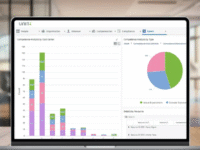Unlocking The Power Of Open Accounting: How To Optimise Your Business Finances

If you’re an entrepreneur looking to take your business finances to the next level, it’s time to explore open accounting. Open accounting is a modern approach to financial planning that can help you optimise your business’s financial health. In this article, we’ll look at some of the most effective uses of open accounting, and how it can help you get ahead.
Introduction to Open Accounting
Open accounting is a term that refers to the process of making a company’s financial information available to the public. This can be done through a variety of methods, such as releasing financial reports or providing access to accounting records.
If you’re thinking of implementing open accounting in your business, there are a few things you should keep in mind. First, you’ll need to make sure that your financial information is accurate and up-to-date. Second, you’ll need to decide how much information you want to make public. And finally, you’ll need to develop a plan for communicating your financial information to interested parties.
With careful planning and execution, open accounting can be a powerful tool for optimising your business finances.
Benefits of Open Accounting
Open accounting is a term that refers to the practice of making financial information available to everyone in an organisation. This includes sharing information about income, expenses, and other financial data. The goal of open accounting is to improve transparency and accountability within an organisation.
There are many benefits of open accounting, including:
1. Improved decision-making:
When all members of an organisation have access to financial information, they can make better decisions about how to allocate resources.
2. Greater transparency:
Open accounting helps to ensure that everyone in an organisation is aware of how money is being spent. This can help to prevent fraud and corruption.
3. Enhanced communication:
Sharing financial information can help to improve communication between different departments within an organisation. It can also help managers to understand the financial needs of their team members.
4. Reduced costs:
Open accounting can help organisations save money by reducing the need for external auditors and eliminating duplicate reporting requirements.
Understanding the Basics of Open Accounting
Open accounting is the practice of making your financial information available to anyone who wants to see it. This includes your income, expenses, and any debts or assets you have.
There are a few things to keep in mind if you’re considering adopting open accounting for your business. First, be sure to consult with an accountant or other financial professional to ensure that all of your financial information is accurate and up-to-date. Second, be prepared to answer questions about your finances from anyone who asks. Finally, remember that open accounting is a public practice, so be sure to only share information that you’re comfortable making public.
How to Optimise Your Business Finances with Open Accounting
Open accounting is a powerful tool that can help businesses optimise their finances. By making financial information more transparent and accessible, businesses can make better decisions about how to allocate resources.
There are a number of ways to optimise your business finances with open accounting. Here are some tips:
- Make sure your financial data is accurate and up to date. This will give you a clear picture of your financial situation and allow you to make informed decisions about where to allocate resources.
- Use open accounting to identify areas where you can save money. For example, you may be able to negotiate better terms with suppliers or reduce unnecessary expenses.
- Use open accounting to improve your forecasting and budgeting processes. Having access to accurate financial data will allow you to make more informed decisions about future expenditure. Share financial information with key stakeholders in your business. This will help them understand your financial situation and make better decisions about their own involvement in the business.
- Keep track of changes in your industry and adapt your business plans accordingly. Open accounting can help you monitor trends in your sector so that you can anticipate changes and adjust your strategy accordingly.
Best Practices for Using Open Accounting
Open accounting is a new way of doing business that is designed to make financial information more transparent and accessible. It allows businesses to share their financial data with external parties such as investors, customers, and suppliers. Open accounting can help businesses save money, improve decision-making, and build trust with stakeholders.
Best Practices for Using Open Accounting
1. Be Transparent:
When sharing financial information with external parties, it is important to be transparent about your intentions and what you are hoping to gain from the interaction. Be clear about what information you are sharing and why you are sharing it.
2. Build Trust:
Sharing financial information can help build trust with stakeholders. When stakeholders see that you are being open and honest about your finances, they will be more likely to trust you and do business with you.
3. Improve Decision-Making:
Open accounting can help businesses save money by improving decision-making. When businesses have access to accurate and up-to-date financial information, they can make better decisions about where to allocate resources.
4. Comply With Regulations:
When sharing financial information with external parties, it is important to comply with all relevant laws and regulations. Make sure you are aware of all the rules that apply to your situation before sharing any information.
The Future of Open Accounting
As the world of accounting evolves, so too does the role of the accountant. The future of open accounting is one that embraces technology and provides greater transparency to businesses and their stakeholders.
Open accounting is the practice of sharing financial information with all interested parties in a transparent and accessible way. This includes sharing data on income, expenses, assets, liabilities, and other financial metrics.
The goal of open accounting is to promote financial literacy and allow businesses to make more informed decisions about their finances. It also allows businesses to hold themselves accountable to their stakeholders and the public.
Technology is playing a big role in making open accounting more accessible and user-friendly. There are now many software platforms that allow businesses to share their financial information easily and securely. These platforms can also help businesses track their progress and performance over time.
The future of open accounting is one that will continue to be driven by technology. The goal is to make financial information more accessible and understandable for everyone involved in a business. This way, businesses can make better decisions about their finances, and ultimately create more value for all stakeholders involved.
Conclusion
Open accounting is a powerful tool that can help business owners unlock the potential of their business finances. By establishing an open and transparent approach to their finances, businesses can get a better understanding of where their money is going and how it affects their bottom line. With the right strategies in place, businesses can use open accounting to optimise cash flow, improve customer relationships, reduce costs, and increase profits. Ultimately, using open accounting provides more insight into your finances so you can make smarter decisions for your business’s success.





